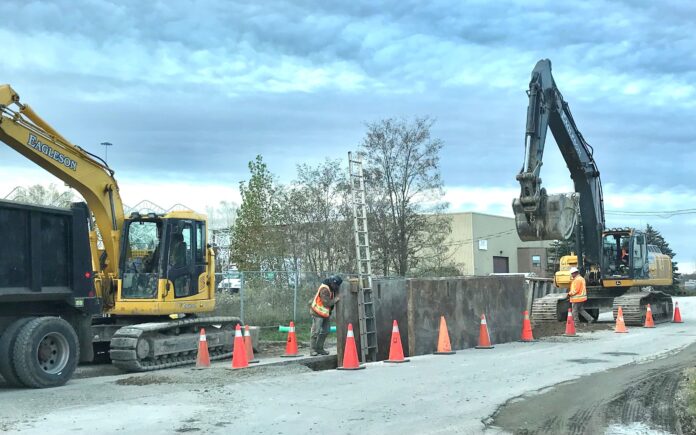OCR Special Feature
A rapidly-evolving public health response to COVID-19 in Canada left municipalities declaring states of emergency and scrambling to respond throughout 2020. Towns and cities across Ontario have implemented and revised policies intended to prevent the spread of COVID-19 and protect employees and citizens.
The Windsor Law Centre for Cities released States of Emergency: Decision-making and participatory governance in Canadian municipalities, a report revealing how municipalities across the country responded during the early parts of the pandemic.
Special report: Clarington — Community Growth in the Face of the Pandemic
“Cities have been faced with some of the most challenging decisions of any level of government during the pandemic. At the same time, they are at the centre of addressing other crises including climate change, systemic racism, and a lack of affordable housing, and budgets are limited,” Professor Anneke Smit, Windsor Law professor and Centre for Cities director said in a news release.
The report was studied municipal government practice during the early part of COVID-19 while offering recommendations for reform to state of emergency legislation. It also looks at changes to municipal approaches to ensure that even in an emergency, public participation in local decision making is maintained, the release states.
“There has been a lot of focus on what decisions are being made, and less on who is at the table to make them. Our report pulls back the curtain to get a better view of this,” Smit said.
The report cites several examples where cities showed innovation to ensure that public engagement and debate continued during the lockdown. Some municipalities didn’t take deputations, but would open up on-line commenting or record a deputation and it would be played during the meeting.
Major decisions – from transit service reductions, to planning decisions, new physical distancing and mandatory mask rules. Here’s how some Ontario municipalities responded to the public health crisis:
Barrie got a passing grade because decisions were made quickly during the early weeks of the 2020 pandemic and council made sure public participation continued. City council and committee meetings resumed fairly quickly with virtual participation and feedback.
Burlington began virtual delegations at standing committees and council in mid-April, with delegates submitting an electronic request to appear to the clerk by noon the day before the meeting. Presenters connect to the system via phone or using computer audio, and delegates are requested to submit their speaking notes in advance, in the event that there are technical issues.
London amended the submission process for all applications pertaining to planning, development, building and licensing. Only digital applications are being accepted for all services, and the processes continues to work smoothly after more than seven months.
Greater Sudbury residents now have more options to apply for community housing through a new online portal, greatersudbury.ca/housing. The easy-to-use online portal is available anytime, anywhere, on any device, to complete an application, check the status of an existing application, change building selections and update contact information.
Windsor City Council returned to a virtual only format for council meetings on Oct. 19, in response to stricter public health restrictions. Council and administration tested a combination of virtual and in-person meetings over the past few weeks, however, now anyone wanting to make a deputation to council must contact the city clerk’s office by noon on the Friday before the meeting.
Hamilton Mayor Fred Eisenberger holds online town hall meetings and media briefings regularly to keep the community informed of new developments at city hall. This was in addition to continuing municipal services virtually starting early in the spring.
Milton more than leads the race in terms of fastest growing cities in Ontario. A major, 10-year roadway expansion and urbanization project on Louis St. Laurent Avenue is currently slated for completion in 2020. Municipal services were quickly shifted online.
Bradford West Gwillimbury offices are now open regular hours. however, virtual services (phone or online) will continue to be provided and residents are encouraged to use these wherever possible. Fewer staff than normal will be in municipal buildings at any one time so residents are encouraged to call ahead and make an appointment.
Kitchener-Waterloo council also shifted services quickly online, and also made the decision to expand bike lane infrastructure – after an overwhelming response on the region’s online engagement platform.
As time went on, some of the COVID-19 entities shifted their focus toward recovery. For example, in July 2020, London’s Economic and Social Impact and Recovery Task Forces began studying 11 recovery ideas in addition to their original 42 relief measures.126 These models of specialized COVID-19 governance require more study, but they hold promise as part of the innovation and flexibility that is possible at the local level.
Toronto City Council has managed through the past few months as a hot spot for the virus. With lockdowns in place and services shifted online, council received input from advocacy organization Progress Toronto asking to start meaningful public discourse on future decision-making. While residents stepped up during the pandemic, the letter suggested the city shift its focus to recovery.
For more information about the municipal response to COVID-19 across Canada read States of Emergency: Decision-making and participatory governance in Canadian municipalities.

